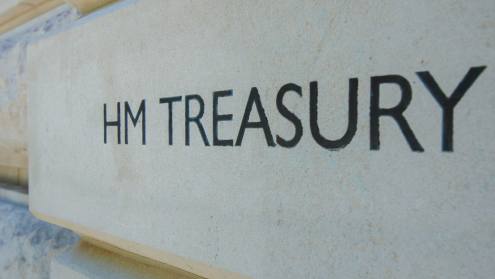Portuguese banking has been criticised in the past for being conservative, excessively prudent and lacking in aggression. In the current climate, these qualities appear not only astute, but are increasingly seen as the defining characteristics for the post-crisis business and regulatory environment that is starting to take shape internationally.
"People are beginning to align the Portuguese way of doing things, traditionally depicted as cautious, unadventurous and safe, with the new realities of the financial world," says Artur Silva Fernandes, vice-chairman and chief executive of Banif Investiment Bank. After the global banking sector went so far in the other direction, he suggests, the more balanced approach of Portuguese banks may represent part of the new way forward.
Portuguese groups have certainly been punching above their weight this year. In the first quarter, Caixa-Banco de Investimento topped the global rankings for public finance initiative (PFI) or public-private partnership (PPP) project finance loans with five deals totalling $871m, and was fifth in the world for project finance loans overall. "Portugal launched public investment measures to stimulate the economy sooner than many of its European peers," says Luís Laranjo, chief executive of CaixaBI. "Although this may not be our natural position in 'normal' conditions, we have taken advantage of the dynamics of a depressed market to seize opportunities."
The same is true of other Portuguese banks, such as Banco BPI and the Espírito Santo group, which also feature among the top 10 mandated lead arrangers for European project finance loans and global PFI/PPP deals in the first quarter. "Crises promote project finance as a favoured means for protecting credit risk," says Mr Laranjo. "As the global economy begins to recover, other models will become cheaper and equity finance will grow."
Landmark deals
As pioneers of project finance lending - some notable Portuguese infrastructure deals date back to the 1980s - banks in Portugal are using their expertise and experience to expand business not only at home, but also in international deals with countries ranging from Brazil, the US and Uruguay to Poland, Spain and the UK.
In the first quarter, for example, Espírito Santo ranked seventh globally for North American project finance loans with three deals totalling €106m. "As financial advisors, we are selling our accumulated know-how in project finance," says Luís Luna Vaz, managing director of Espírito Santo Investment. "This also provides us with opportunities to participate in the financing."
Espírito Santo recently concluded its first project finance deal in Poland, participating in the financing of a €1.6bn motorway link between Nowy Tomysl and Swiecko, one of the country's leading PPP road contracts. The European Investment Bank (EIB) is providing €1.2bn of the financing, the bank syndicate €400m and the sponsors €200m of their own capital.
This structure reflects the more cautious approach to PFI/PPP funding in today's complex markets, where the appetite for revenue risk is low. "Banks are asking for stronger guarantees and taking lower tickets than two years ago," says José Caldeira, a project finance and infrastructure specialist with CaixaBI. "They are also paying much closer attention to the composition of construction consortiums as well as to the debt levels of individual companies and their ability to handle cost variations."
Extra commitment
At the same time, sponsors are seeking more support from concession awarders. "Granters are having to make deeper commitments than in the past, accepting less favourable conditions and fewer guarantees in a trade-off between less advantageous financial conditions and the need to promote business and stimulate economic growth," says Mr Caldeira. In this context, governments and other granters are focusing on refinancing clauses, aiming to ensure that they can refinance contracts at better terms over the medium term.
EIB involvement is also growing stronger, to compensate for the reduced capacity of commercial banks to finance major shares of large-scale projects, says Mr Caldeira. This is the case for Portugal's own ambitious infrastructure programme. The country's socialist government has laid out plans for a new Lisbon airport, high-speed train links, roads, energy projects, hospitals and school renovations, expected to cost more than €60bn over the next decade.
Opposition parties are contesting the plans in the run-up to a general election in September but financial closure has already been reached and construction started on a significant number of concessions. Bankers believe the essential outlines of the programme are unlikely to be shelved, whatever the outcome of election, although some projects could face politically motivated delays.
The role of the EIB was crucial in the landmark Tunel do Marão deal, Portugal's largest toll road project to date, which includes a 5.6 kilometre two-gallery tunnel through a mountain. The 30-year concession, financed by a three-tranche facility totalling €423.5m, was signed in April 2008 by the original senior syndicate of six banks - CaixaBI, HBOS, Fortis, Royal Bank of Scotland, WestLB and La Caixa.
As market conditions deteriorated, however, the prospect of junior syndication receded because other partners were unwilling to take on traffic revenue risk. This led the syndicate to secure a participation of €180m, as well as its first-ever loan guarantee for a transport PPP, amounting to €20m.
The deal was already innovative as the government contracted to pay the concessionaire not only on the basis of traffic flows, but also according to the availability of the roadway, meaning that lane closures for maintenance and similar constraints will affect payment.
Portugal was also responsible for Europe's latest large-scale initial public offering (IPO), before the collapse of Lehman Brothers brought primary equity markets to a virtual standstill. EDP Renováveis, the renewable energy arm of Energias de Portugal, the country's dominant power utility, raised €1.6bn from the IPO last year. CaixaBI, Millennium Investment Banking, Espírito Santo Investment, Citigroup, Morgan Stanley and UBS were joint global co-ordinators and joint bookrunners.
The 25% offering, in the form of a capital increase, went ahead in June last year amid adverse market conditions when markets were falling, record numbers of companies were cancelling or suspending IPOs and renewable energy stocks had been losing ground for the previous six months. The offer was further complicated by the need to list a company with its headquarters in Spain on the Portuguese stock exchange and a specific allocation system involving EDP Group shareholders and employees.
Despite the negative conditions, the institutional tranche was more than six times subscribed at a price close to the midpoint of the range offered, fully achieving the company's goal of raising finance for an ambitious investment programme. "The offering was made in the last possible window," says Ana Santos Martins, managing director of equity capital markets at CaixaBI. "A few weeks later and it would have been completely impossible."
Primary equity markets remain depressed, but significant activity has returned to secondary markets. "The first semester of 2009 has been the busiest of the past two years in terms of secondary markets," says António Guerreiro, chairman and chief executive of Banco Finantia, an independent investment bank. "Investors have increased their appetite for risk and are showing a strong interest in diversifying their portfolios and investing in shares of companies they consider to be undervalued, but with good prospects." Despite this upward trend, which began in March, markets remain volatile, says Mr Santos Martins, and the IPO market is not expected to become active again before the end of the year.
Financing measures
Meanwhile, companies are financing themselves through debt issues. Portugal Telecom and EDP recently made successful medium-term note issues of €1bn each at coupons of 6% and 4.75%, respectively. Espírito Santo was one of the joint bookrunners. "This shows that international markets are quite receptive to Portuguese companies," says Mr Luna Vaz. "Both companies managed to improve their price during the operation and both attracted strong demand, spread widely across Europe. The key to success of the leading Portuguese companies is that they have already internationalised to develop their operations and secure international ratings to find new sources of funding." Banks are also successfully raising funds through issues that sometimes involve the use of state guarantees.
Demand is growing for acquisition finance as other companies seek to internationalise and Portugal's infrastructure programme leads to mergers and to the acquisition of some project licence holders. "It is not a question of choice. Companies have to expand," says Mr Laranjo. "Groups that set out three-year plans two years ago, for example, are committed to recovering at least part of those programmes."
Some Portuguese companies are seizing opportunities to move into Spain, partly rebalancing an investment trend that has always been moving overwhelmingly in the opposite direction. In June, for example, a Portuguese car park company, backed by Portuguese risk capital, acquired Cintra Aparcamientos, Spain's leading car park operator - three times the size of the acquirer - in a €451m deal.
Addressing risk
In asset management, Portuguese banks are dealing with risk aversion by creating alternative funds less directly related to stock market trends. "As we saw investors moving out of mutual funds into the safe haven of deposits, we adopted a strategy of creating alternative funds offering growth prospects that are not closely correlated with equity markets," says Mr Fernandes. About 40% of the €3bn in funds that Banif Investment Bank manages now falls into the category of alternatives assets, including carbon trading, renewable energy, infrastructure, fine art and a range of real estate funds.
Demand for these alternative funds has been strong and performance has outshone equity market indexes. Bankers helped to persuade Portugal's stock market authorities to introduce special legislation to accommodate the new funds. "We were able to demonstrate that special investment funds like these would go offshore if the appropriate regulatory environment was not created," says Mr Fernandes. "We were keen to ensure that were kept onshore and properly regulated."
Portugal questions its credit rating downgrade
Portugal was the third eurozone economy after Spain and Greece to suffer a credit rating downgrade at the start of this year due to its failure to tackle deteriorating public finances. Standard & Poor's reduced its long-term rating to -AA, six notches below the highest AAA rating, increasing the cost of issuing government bonds. It said Portugal faced "increasingly difficult challenges" to improve competitiveness while tackling a "heavy debt burden" and "persistently low growth", and government attempts at reform were "insufficient".
But government ministers and some bankers consider the downgrade unjustified as the government had succeeded in cutting the budget deficit from 6.5% to 2.2% of gross domestic product (GDP) in only four years. The social security system has undergone sweeping reform and there has been no real estate boom in Portugal, they say.
There has been a 22% increase in exports in the three years to 2009 and they say lower oil prices and big investments in renewable energy will help reduce the current account deficit in the medium term. The deficit is the equivalent of about 9% of GDP.
Despite confidence in Portugal's credit rating, the government and central banks have downgraded their economic forecasts several times in response to what finance minister Fernando Teizeita dos Santos called a "worsening external environment that cannot be ignored".
According to the Organisation for Economic Co-operation and Development, "Portugal is in the midst of a deep recession as the collapse of external demand and tight financial conditions have affected all parts of the economy, particularly exports and investment."
It expects business activity to contract throughout 2009, before recovering very slowly in 2010 as the global economy and financial conditions gradually improve. The unemployment rate is set to reach double digits, while sharply lower commodity prices and a large negative output gap will leave inflation at very low levels. The budget deficit is expected to deteriorate significantly in 2009, reflecting weaker economic conditions, lower revenues and spending rises to support the economy.

Global Project Finance Loans












